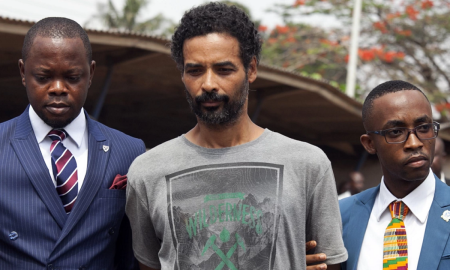Police in dock as murder suspect slips off to Ghanaian beach for Christmas

The Independent Police Complaints Commission has launched an investigation into how police handed its hunt for murdered EastEnders actress Sian Blake.
A court in Ghana heard this week how an uncooperative and dismissive Arthur Simpson-Kent, who is wanted for questioning in the UK in relation to the murder of the former soap actress and their two sons, told police investigating a missing persons report that the family had gone to visit a friend.
Simpson-Kent, who was discovered on a Ghanaian beach following a brief manhunt, was spoken to by police at the family’s home in Erith, Kent on December 16 after relatives expressed concern over the whereabouts of Ms Blake, who played man-hungry singer Frankie Pierre in the soap. Principal State Attorney Rebecca Abjalo told how officer’s left, apparently satisfied with the 48-year-old hairdresser’s explanation that Ms Blake, 43, had taken Zachary, aged eight and Amon, four, to visit a friend in Cambridge.
Three days later, Simpson-Kent left the country for Ghana. After the Christmas/New Year period, officers found Ms Blake’s blood-splattered car and, another two days later, her body was discovered alongside her two sons in the family’s back garden. All three died of head and neck injuries.
Wearing a grey T-shirt, Simpson-Kent appeared in the dock at Kaneshie Magistrates’ Court in Accra with his hands handcuffed behind his back, where he kept them even after the cuffs were released.
He is accused of killing Ms Blake and their sons by using ‘unlawful harm’ on or about December 16. He was remanded in custody until January 26, when a decision is expected on whether to send him back to Britain. As yet there has been no formal request for extradition from British authorities but it is expected to be a formality since Britain and Ghana enjoy cordial diplomatic relations.
Ms Abjalo told the court that Ms Blake’s Renault Scenic was found dumped in Bethnal Green on January 3rd. By then Simpson-Kent had travelled by coach to Glasgow before flying via Amsterdam to Ghana, where his mother was born, on December 19. He had marked a false date on his landing card, stating that he arrived on December 7, the court heard. He then spent three weeks on the run before being seized by local police in a remote village in the west of the country.
Ms Abjalo said: “The police officers visited the apartment again on January 5 but the accused person had vacated the premises. After a thorough search of the property officers found the body of Sian Blake and her children buried in a shallow grave in the garden.”
She added that officers first spoke to Simpson-Kent at his family home after a relative lodged a complaint about Ms Blake’s disappearance.
Harvard trained lawyer Justice Srem-Sai, representing Simpson-Kent, complained that he had only been allowed to see his client when he arrived at the court and accused the authorities of ‘blatant violations’ of due process.
The lawyer complained that the ‘Ghanaian procedure for extradition were not followed (sic)’ when Simpson-Kent was arrested and said he should be released. He refused to confirm whether the suspect would fight his extradition to the UK.
Simpson-Kent spoke only to confirm he understood the proceedings during the half hour hearing.
After he gave a mumbled response, magistrate Her Worship Rosemund Dodua Agyiri told him: “Speak up you are not speaking to your girlfriend you are talking to me up here. I cannot hear you.”
Following the hearing, Simpson-Kent was returned to Ghana’s maximum security jail at the Bureau of National Investigations – the country’s equivalent of MI5 – where terrorists are kept while they await trial. He had been transferred to the secretive facility – which has razor-wire topped 15ft high walls and no sign to identify it – after being arrested on Saturday in the remote area of Butre, 200 miles from Accra.
The hairdresser had been living in a cliff top lair above a remote beach, where he was holed up in the grimy shower cubicle of a locked and disused villa and allegedly spent his days drinking, dancing and lying on bamboo rafts.
Speaking about the prison, a Ghanaian security source said: “This is a notorious place for sensitive prisoners and people who are a threat to the country. It is used when authorities do not know where else to take suspects. There is no chance of anyone breaking out here.”
Coconut shells were found left at the makeshift campsite where Simpson-Kent was hiding. Police also found a haul of documents, including a passport, credit card and National Insurance card.
Locals have locals described how the apparent vacationer danced and partied in the resort and spent his days lying on bamboo rafts and drinking beer before his arrest. According to residents, the suspected killer told others in the resort that he was ‘done with his life in the UK’ and was plotting to start a new life in Ghana.
London-born cafe owner Karole Ainoo described how she thought Simpson-Kent seemed ‘almost saintly’ when she first met him, as he claimed he wanted to produce cannabis for a sick relative.
She said he became a regular in the cafe and remembers him ‘dancing like mad’ at the New Year’s Eve party at the Rainbow Hotel in the resort as he was wanted in connection with murder.
“Soon after his arrest I got a call from the Met and I told them I was so disappointed not have been contacted by any of their officers. It was all down to Ghana police and Busua village and my friend Idris, and I’m so proud of them.
“When I asked the Met officer why they hadn’t done this work themselves he told me they didn’t have the powers, it had to be local police, there was too much red tape. I said, ‘What about Interpol?’ and he said, ‘They are mainly just guys sitting in an office somewhere, just liaising.’
“I told him that local people were heroes in my eyes, as well as the Ghana police who acted so fast and efficiently without any of the Met’s funding and resources.”
Speaking at the scene of the arrest, Deputy Detective Superintendent Hansen Gove from the Ghanaian police told an interviewer he was “incredibly proud to have brought in a fugitive so quickly and calmly, without injury to anyone”.
He added: “It will be a great pleasure to report all this to the Met police, who arrived from England last night and have not been anywhere near this area or this crime. Maybe we could offer some detective training to Scotland Yard?”
While many other locals have been wondering what took the police so long to apprehend Simpson-Kent, with some claiming to have contacted British police several days before, having seen news of the manhunt on social media, such comments are bound to increase the pressure on the Metropolitan Police to explain why what has turned out to be a drawn-out and, no doubt, costly pursuit was not concluded weeks ago when their chief suspect was just the regular arm of the law away.










